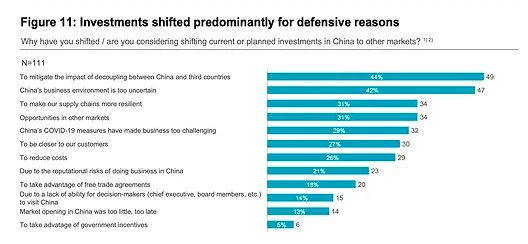This article was originally published on July 4, 2023 on holch.biz. Thank you to the author for the kind authorization to re-publish.
The international business community’s anxiety and protest over China’s newly forged ‘foreign relations law’ has been exceptionally loud even for today’s conflictual times. I recommend checking the details in your most trusted media to see why everyone’s worried. Foreign executives in China fear that regular business activities like data collection and focus groups may seem like spying to authorities. Chinese firms fear foreign partners may disengage or disappear in part or altogether, further weakening the already waning international exposure of PRC businesses.
I got several enquiries last week about how executives at multinational firms can prepare themselves for the new law, or at least for examples how they try. Some ask whether the law will further weaken China’s international attractiveness, because if it does, it will be even harder to get investment, talent and know-how to the China branches of global firms. My opinions will appear in different publications over the coming weeks, but in the meantime, here are a few urgent points for those who must decide about their business’s direction in China.
At my executive coaching, workshops and speeches, I always suggest starting from a clear awareness of the situation. Sometimes that requires more data. At others, awareness is about the limitations of what decision-makers can and cannot do. I think China’s new law is an example of the latter.
What international managers cannot do
Fully understand the law itself: A journalist sent me her enquiry with a full Chinese-language copy of the law. But although research shows that foreign firms increasingly appoint fluent Mandarin speakers to lead their China branches (see China CEO II for instance), few of them can digest a ten-page legal document at a glance. If they can, it seldom helps. Chinese laws that regulate foreign business are routinely passed in a hurry and without consulting external stakeholders. They also follow a principle to enforce first, clarify later, which allows authorities time and flexibility to figure out what they really want to achieve.
Predict the law’s implications for foreign firms: Who could predict last year’s tech crackdown, anti-corruption measures a decade ago, or China’s 2007 blockage of foreign social media? China’s regulatory environment has never been predictable, and polls show it worsened in recent years. While I chaired a working group at the EU Chamber China, I learned how the goal, scope and enforcement of new laws changed with the foreign business community’s evolving reaction. The current law is fittingly confusing. Beijing’s claim that its clearer compliance standards help foreign firms clash with references to “extraterritoriality” and exploitation of China by foreign business. Papers like The Asia Times think it aims to “punish decoupling”. Others think everything in-between.
Influence its enforcement: In most jurisdictions, the passing of similar laws triggers frantic government lobbying by businesses over enforcement. But China has long separated local firms from “foreign-invested enterprises” by law. Moreover, foreign nationals are excluded from most legal, political and law enforcement professions in the PRC. Consequently, no official forums exist for such mediation. Chambers of commerce have limited lobbying powers. Following draconian anti-corruption campaigns, government and party officials distanced themselves from foreign networks. While many Presidents and CEOs of Chinese firms sit in the nation’s legislative bodies, foreign firms have nowhere to share their side of the story, not to mention active participation. Are foreign businesses helpless sitting ducks, then?

Source: European Union Chamber of Commerce in China
What international managers can do
Protect their processes: Before giving up hope, remember how many similar storms global firms weathered in China and elsewhere. Games of resilience and agility between multinationals and governments are woefully unfair, because corporations can move resources faster and have better lawyers, managers, experts and storytellers. In my new book Dragon Suit. The Golden Age of Expatriate Executives in China, luxury sector executives explain how President Xi’s anti-corruption campaign killed half their business, which they soon regained. As laws and restrictions change, foreign firms shuffle data, research, production and people in and out of China with impressive speed, for a single meeting, project or forever. By the time you’ve read this article, corporate lawyers, techies and strategists have brainstormed twenty measures for the new law, and frantically started unrolling five of them.
Mediate good intentions in China and worldwide: The downward spiral of mistrust and misalignment between China and its trading partners rests on mutual blame. “Long before Trump became the President of the United States, President Xi Jinping had already begun the process of decoupling,” author Vijay Gokhale told MERICS recently. China blames everyone else. As a coach, I encourage executives to break such vicious circles by simply communicating. There is plenty of remaining good will between China and abroad, even unlikely counterparts like Japan and the United States. Business unites where politics divides. While politicians plot, most people on both sides of barriers want to learn, trade, earn and help those they can. International managers, from expat executives to travelling salespeople, can have conversations where statesmen and diplomats are restricted by their mandates.
Broker balanced China strategies: The saddest long-term consequence of current conflicts is that withdrawal from interaction and communication makes separation increasingly irreversible. Eventually, empathy vanishes and people on the other side turn into dehumanised stereotypes unworthy of help or mercy. International managers in China, or with previous experience there, must step in before it’s too late. China is sealing itself in a legal, political and digital echo chamber, so they must add its side to the conversation at boardrooms and project meetings. If they can, they should do the same at political forums. Although headquarters seldom love what they hear from the seasoned China hands I call “Dragon Suits” in my book, letting the world build East-West strategies on incomplete or biased information is bad for everyone, the firm and China-facing managers included.
Picture credits: holch.biz






Be First to Comment